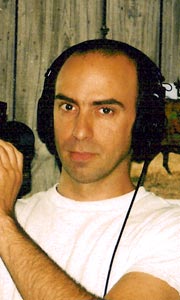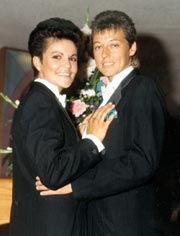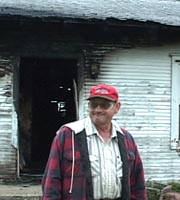New Documentary Makes the Case for Gay Marriage
![]()
 Brooklyn filmmaker Jim de Sève highlights personal struggles for same-sex marriage rights in Tying the Knot.
Brooklyn filmmaker Jim de Sève highlights personal struggles for same-sex marriage rights in Tying the Knot.
Courtesy of Roadside Attractions
 Lois Marrero, left, and Mickie Mashburn on their wedding day, 13 years before a bank robber's bullet killed Marrero.
Lois Marrero, left, and Mickie Mashburn on their wedding day, 13 years before a bank robber's bullet killed Marrero.
Courtesy of Roadside Attractions
![]()
 Sam, an Oklahoma rancher, whose husband of 22 years left him their ranch, stands in front of a burned house on their property.
Sam, an Oklahoma rancher, whose husband of 22 years left him their ranch, stands in front of a burned house on their property.
Courtesy of Roadside Attractions
Like the insta-ads put out by presidential campaigns and the 527’s, political documentaries are popping up to attack or defend candidates and explore issues using strong points of view and remarkably recent footage. In response to the war on terror and the war in Iraq came Uncovered and Fahrenheit 9-11. To expose an electoral war on African American voters in Florida in 2000 came Unprecedented; and to illustrate Fox News’ war on journalism came Outfoxed. Now, for the political war on gay marriage, Brooklyn resident Jim de Sève has released his own film, Tying the Knot.
The movie began as a small project when de Sève decided to explore the institution of marriage after his Indonesian boyfriend had to get political asylum as an alternative to marriage if he wanted to stay with de Sève. When same-sex marriage exploded as a political issue in Holland, Canada and the United States during the last three years, de Sève’s film grew and so did his political motivations.
The movie focuses on two personal narratives. In Tampa, Fla., a police officer, Mickie Mashburn, fights for the pension benefits of her deceased partner, Lois. The two women met on the police force, were married in 1991 and were a happy couple until 2001 when a bank robber shot and killed Lois. Meanwhile, in Oklahoma, Sam is being evicted from his ranch. He is 60 and faces life without Earl, his partner of 22 years. They built the ranch together and raised Sam’s three sons. When Earl died, he left the ranch to Sam in his will, but a legal technicality – having only two signatures and not three – allowed a cousin to challenge the will and evict Sam.
De Sève obviously had clear reasons for choosing both a cop and a good ol’ boy who happen to be gay. He had his audience in mind. “I wanted to be able to show a legislator in Oklahoma this film,” he said during a recent interview in Greenwich Village. “If I were to show this to the members of the Angus Beef association at their annual picnic, which I want to do at some point, I just want the thing that really strikes them to be someone like Sam.”
“If you ride horses and drive cattle, then I guess I am [a cowboy],” Sam said in a slow drawl, typical of rural Oklahoma and much of Bush country. He is also a veteran who doesn’t like New York or any city and thinks being a movie star would be “rather frightening,” yet he was just in town for the opening of Tying the Knot. Sam, though, has recently appealed his case to the U.S. Supreme Court, another thing he never imagined doing before Earl died. “I miss him, I miss him a lot,” he says in the movie. “If he were here now, I wouldn’t be having all the problems I’m having.”
As an emergency first responder, Marrero’s presence in the movie is less cultural and more political. The flag-draped coffin at her funeral and the testimonials about her honorable service drive home the point that same-sex marriage is an issue that affects members of America’s hero class, particularly in light of the number of gay and lesbian police officers and firefighters killed on September 11, 2001.
De Sève punctuates emotional narratives with news events that helped turn gay marriage into a contemporary political hot topic, including Congressional debate over the Defense of Marriage Act, the Mayor Gavin Newsom-approved weddings in San Francisco, and President Bush’s endorsement of the Federal Marriage Amendment. De Sève is open about his political intentions in filmmaking and proud to be part of the recent trend. “I wanted to mix politics or understanding of politics with the personal stories,” he said.
Even the marketing of the movie is political. De Sève and Roadside Attractions, the project of indie distributors Howard Cohen and Eric d’Arbeloff, have taken a grassroots approach to marketing the film. Cohen and d’Arbeloff have been together as a couple for nine years and in business together for nearly a year. (Their first big hit was Super Size Me.) Their idea for Tying the Knot is to recruit political groups like the Human Rights Campaign, Marriage Equality and the Gay Officers Action League to encourage their membership to see the movie and to spread the word. “Initially our strategy is to build the gay and lesbian base in the same way that My Big Fat Greek Wedding was successful because [Nia Vardalos] got all the Greeks to come out and support the film,” de Sève said.
It is a matter of practice for Roadside Attractions to market movies that appeal to established niche markets, like the LGBT community, but the decision to work on the distribution of Tying the Knot was “equal parts business and personal,” Cohen said in a recent telephone interview. Cohen sees the marriage issue as a high-stakes political one.
“If we don’t win it, we will lose big way beyond the marriage issue,” he said. Cohen is still a businessman who doesn’t want to lose money and said that political marketing is cheaper than advertising. Roadside Attractions considered distributing the movie on DVD but decided on a theatrical release, hoping that an initial run in eight cities (that began Oct. 8) will lead to wider distribution. That would not only serve their business purposes, but their political ones as well. “If it can have an impact on the debate and help people understand the human element, that would be great,” Cohen said referring to the movie. Besides, he said, political documentaries are giving audiences news and information they do not get from traditional news sources like radio, television and newspapers.
One effective example according to de Sève and Cohen is the explication of the ubiquitous claim among same-sex marriage opponents that marriage has been a static foundation of society for thousands of years. EJ Graff, the author of What Is Marriage For? explains on camera how the definition of marriage changed dramatically throughout history with events like the U.S. Supreme Court case Griswold v. Connecticut (1965), which legalized contraception. “The idea that you can have sex not just for making babies, but for making intimacy, for making love, is the idea that’s endorsed by legal contraception,” Graff says in the film. “As a society, we have decided that making love is a legitimate reason for having sex and for being married. This is the philosophy same-sex couples fit under.” Both Cohen and de Sève cited Graff’s book as inspiration for their decision to work on this film.
As for Sam, his decision was in part self-defense. “When they kick you, they kick you so far,” he said, referring to the legal attacks that evicted him from his farm. “You have to do something or go down silently and I couldn’t do that.” Sam wants to start ranching again someday, but by sharing his story on the big screen he has become a reluctant spokesperson in the fight for equal civil marriage rights. “I’d rather stay home,” he said. “But I am hoping it is well worth it for other people. I may not live long enough to see it, but maybe they will.”
![]()
